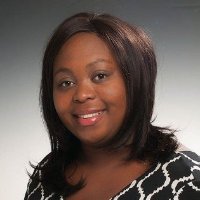When she says it’s personal, she’s talking about the poverty rate consuming the streets in North Philly where she grew up visiting her grandma. When she says it’s personal, she’s talking about the niece and nephew who got word that their schools were closing. When she says it’s personal, she is talking about the kind of public service she saw growing up, mentored by a group of firefighters, including her Dad, Lloyd, who rose to the rank of Commissioner.

“They were guys who’d see a problem right there, and solve the problem,” says Jenne’ Ayers. “Not only were they putting their life on the line every day; there was also a direct connection between problem and solution. There’s a fire? You put it out.”
So the at-large Council candidacy of this Millennial turns on that proposition: Shouldn’t our elected representatives approach their positions more as firefighter than as finger-to-the-wind politician? “I’d come back from Cambridge or New Haven and I realized problems weren’t being dealt with, that I was watching Philadelphia become a tale of two cities,” says Ayers. “That started to bother me. There were all these new initiatives going on—the Millennials, the downtown looking wonderful. But we also have the deepest poverty rate in the nation. This is personal to me. I realized I have the skill set and the passion to make a difference.”
“City Council traditionally underutilizes its role as convener,” Ayers says. “You can use the influence of your seat to bring together people who will work in harmony to solve problems. But you have to have humility and submit yourself to the larger issue and goal.”
So she’s running; when I caught up with her last week, she’d just braved frigid temperatures for hours to collect petition signatures. At Wal-Mart, would-be constituents peppered her with questions (“What does a City Councilwoman do?”) and complaints about just how unresponsive local government can be. She listened and tried to educate. Meanwhile, between the strategy sessions and fundraising calls, the self-described policy nerd is trying to carve out time to keep her nose buried in wonky tomes about urban renewal.
Between college and law school, Ayers worked as a consultant for the nonprofit Bridgespan Group, a social impact advisor to mission-driven organizations. That work provided her, she says, with a kind of urban policy master plan. She traveled the country working with organizations that are on the frontlines of issues surrounding education advocacy, housing, and community revitalization—the organizations doing the hard work of turning around neighborhoods. Ayres not only helped them with their action plans, she shared with them strategies to measure their impact and scalability. She came to develop a different way of thinking about the role of urban elected official. Too often, politicians portray themselves as a type of policy Superman, possessor of the answer to our social ills. Ayers realized that what was needed was a master convener. “City Council traditionally underutilizes its role as convener,” she says. “You can use the influence of your seat to bring together people who will work in harmony to solve problems. But you have to have humility and submit yourself to the larger issue and goal.”
In other words, no grandstanding. I ask for a concrete example, and Ayers gets breathless—she’s in her nerd comfort zone. “There’s an initiative in Cincinnati called STRIVE Partnerships,” she says, referring to a program written about in the Huffington Post and The Citizen. “They got all these non-profits—after-school groups, Church organizations, philanthropies—to come together and share data and problem-solving goals. They said, ‘Here’s the birth to college pipeline. Third grade reading makes the biggest difference.’ So all these stakeholders agreed to target their efforts in line with these pipeline goals. Government helped get all these arrows pointing in the same direction. All these groups shared data amongst themselves. So Janey’s teacher could see if Janey suddenly wasn’t showing up at her after-school program, and her tutor could see if she suddenly started messing up on her homework. You need this information to intervene in a smart way.”
I tell Ayers, only half-kidding, that it sounds too rational for Philly. Here, too often, politics is all about power as an end in and of itself. That’s why, when the at-large candidates released their fundraising totals in early January, Ayers was dismissed by the horserace-obsessed insiders; she’d only raised a couple of thousand of dollars. “I had just formed my political committee,” Ayers says. “I knew when I announced in January what that would look like. Next report, people will see we’ve raised a good amount.”
Besides, Ayers says, the focus on fundraising only shows how a candidate is resonating with a very particular set of constituents. “I’m not sure it’s a good barometer of how you’re registering with the people,” she says.
What matters to Ayers is service, and she’ll take members of her own generation to task for not getting engaged. It’s a notion that was modeled for her. Her father was a firefighter who became Commissioner when Jenne’ was at Masterman. She watched him, and learned the power of setting bold goals. “In the ‘90s, hundreds of people were dying in fires each year and my Dad said we were going to have zero fire deaths,” she says. “It was unheard of. Most people said it was impossible. Well, we didn’t reach zero, but we went from over 100 to 25 in 2012. That’s what can happen when you set aggressive goals.”
And what would Jenne’ Ayers’ aggressive goal be? “That our poverty rate, on all indicators, will be below the national average,” she says. “It may take some time, because right now we’re the worst in the nation. But we need leaders now saying we can get do better than the average city, because we are better than the average city.”


